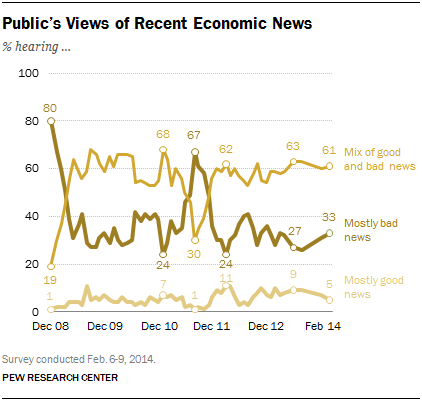
 Survey Report
Survey Report
 Over the past year, the unemployment rate has fallen, but so too has the share of Americans in the labor force. The stock market rose during much of 2013, before falling at the start of this year.
Over the past year, the unemployment rate has fallen, but so too has the share of Americans in the labor force. The stock market rose during much of 2013, before falling at the start of this year.
Through it all, the public’s perceptions of economic news have changed very little. Currently, 61% say the news they are hearing about the economy is a mix of good and bad, 33% say it is mostly bad and just 5% say it is mostly good.
The public appears to view economic indicators – both good and bad – with a measure of caution. For example, 21% say they are hearing mostly bad news about the stock market while 13% say it is mostly good; 49% say it is mixed. Last June, opinions were more positive – 24% said the stock market news was mostly good while 16% said it was mostly bad. Yet half said the stock market news was mixed, virtually the same as today.
The new national survey by the Pew Research Center, conducted Feb. 6-9 among 1,004 adults, finds that views about news on other economic sectors are mostly unchanged since December. More are hearing good news about real estate values (25%) than bad news (19%); while it is the only economic sector registering more good news than bad news, a 44% plurality still says it is hearing mixed news. Regarding the job situation, more of the public is hearing mostly bad news (42%) than mostly good news (12%).
 Since 2009, the percentage of Americans describing jobs news as mostly bad has ranged from 74% in August 2011 to 38% in June 2013 and March 2012. But these perceptions have fluctuated only modestly since the fall of 2012. (For more on long-term views of news about specific economic sectors, see the charts at the end of the report.)
Since 2009, the percentage of Americans describing jobs news as mostly bad has ranged from 74% in August 2011 to 38% in June 2013 and March 2012. But these perceptions have fluctuated only modestly since the fall of 2012. (For more on long-term views of news about specific economic sectors, see the charts at the end of the report.)
Views of news about gas prices have become much more positive over the past year. Currently, as many say news about gas prices is mixed as say it is mostly bad (39% each); 14% say news about gas prices is mostly good. A year ago, 53% said news about gas prices was mostly bad and, as prices climbed in March, the percentage with a negative assessment of news about gas prices surged to 74%. But as gas prices have fallen, perceptions have improved.
 Majorities across income categories view overall economic news as mixed, but there are wider variations in perceptions of news about individual sectors. For instance, 43% of those with family incomes of $75,000 or more say news about real estate values is mostly good, compared with just 23% of those with incomes between $30,000 and $74,999 and 17% of those with incomes of less than $30,000.
Majorities across income categories view overall economic news as mixed, but there are wider variations in perceptions of news about individual sectors. For instance, 43% of those with family incomes of $75,000 or more say news about real estate values is mostly good, compared with just 23% of those with incomes between $30,000 and $74,999 and 17% of those with incomes of less than $30,000.
Notably, perceptions of news about the job situation are most negative among those in the middle-income category. About half (51%) of those with incomes between $30,000 and $74,999 say news about jobs is mostly bad; that compares with 39% of those with incomes below $30,000 and 32% of those with incomes over $75,000.
Perceptions of recent stock market news do not significantly differ by income. About half in all three income categories say recent news about the stock market has been a mix of good and bad. There also are only modest differences across income categories in perceptions of news about gas prices and prices for food and consumer goods.
The Week’s News
 As the Winter Olympics get underway in Sochi, Russia, 18% are following news about the games very closely.
As the Winter Olympics get underway in Sochi, Russia, 18% are following news about the games very closely.
This share is similar to the percentage that very closely followed the first weekend of the 2012 Summer Games in London (18%) and the 2010 Winter Games in Vancouver (19%). A slightly greater share (24%) closely followed news about the start of the 2008 Summer Games in Beijing.
News about the U.S. economy (28%) and the continuing rollout of the 2010 health care law (23%) were the top stories of the week. An additional 17% closely followed news about the decision by drugstore chain CVS to stop selling cigarettes. One-in-ten adults (10%) closely followed news last week about the death of actor Philip Seymour Hoffman, who died Sunday, Feb. 2.



